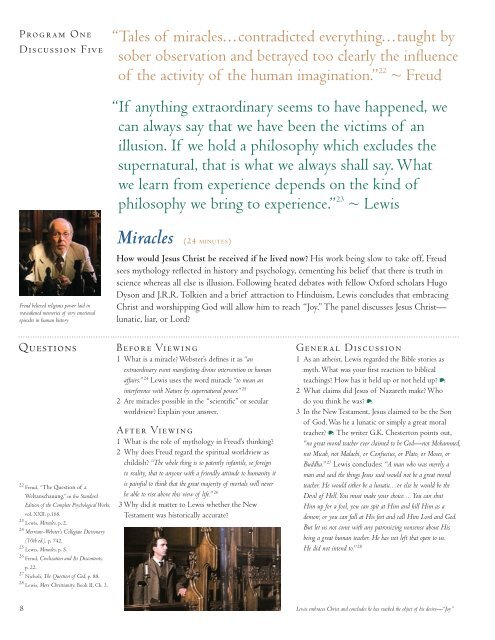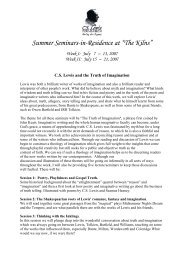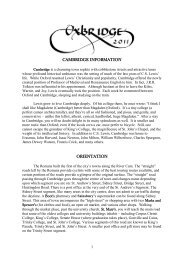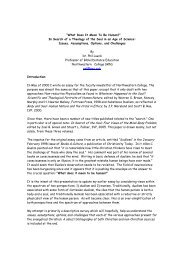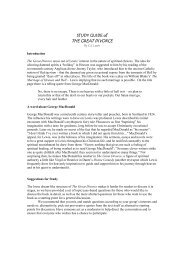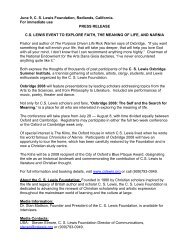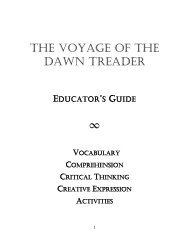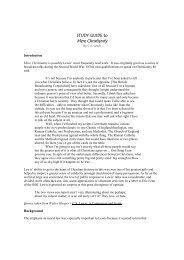The Question of God discussion guide - PBS
The Question of God discussion guide - PBS
The Question of God discussion guide - PBS
You also want an ePaper? Increase the reach of your titles
YUMPU automatically turns print PDFs into web optimized ePapers that Google loves.
Prog ram One<br />
Discussion Five<br />
“Tales <strong>of</strong> miracles...contradicted everything...taught by<br />
sober observation and betrayed too clearly the influence<br />
<strong>of</strong> the activity <strong>of</strong> the human imagination.” 22 ~ Freud<br />
“If anything extraordinary seems to have happened, we<br />
can always say that we have been the victims <strong>of</strong> an<br />
illusion. If we hold a philosophy which excludes the<br />
supernatural, that is what we always shall say. What<br />
we learn from experience depends on the kind <strong>of</strong><br />
philosophy we bring to experience.” 23 ~ Lewis<br />
Freud believed religious power laid in<br />
reawakened memories <strong>of</strong> very emotional<br />
episodes in human history<br />
Miracles (24 MINUTES)<br />
How would Jesus Christ be received if he lived now? His work being slow to take <strong>of</strong>f, Freud<br />
sees mythology reflected in history and psychology, cementing his belief that there is truth in<br />
science whereas all else is illusion. Following heated debates with fellow Oxford scholars Hugo<br />
Dyson and J.R.R. Tolkien and a brief attraction to Hinduism, Lewis concludes that embracing<br />
Christ and worshipping <strong>God</strong> will allow him to reach “Joy.” <strong>The</strong> panel discusses Jesus Christ—<br />
lunatic, liar, or Lord?<br />
<strong>Question</strong>s<br />
22 Freud, “<strong>The</strong> <strong>Question</strong> <strong>of</strong> a<br />
Weltanschauung,” in the Standard<br />
Edition <strong>of</strong> the Complete Psychological Works,<br />
vol. XXII, p.168.<br />
23 Lewis, Miracles, p. 2.<br />
24 Merriam-Webster’s Collegiate Dictionary<br />
(10th ed.), p. 742.<br />
25 Lewis, Miracles, p. 5.<br />
26 Freud, Civilization and Its Discontents,<br />
Before Viewing<br />
1 What is a miracle? Webster’s defines it as “an<br />
extraordinary event manifesting divine intervention in human<br />
affairs.” 24 Lewis uses the word miracle “to mean an<br />
interference with Nature by supernatural power.” 25<br />
2 Are miracles possible in the “scientific” or secular<br />
worldview? Explain your answer.<br />
After Viewing<br />
1 What is the role <strong>of</strong> mythology in Freud’s thinking?<br />
2 Why does Freud regard the spiritual worldview as<br />
childish? “<strong>The</strong> whole thing is so patently infantile, so foreign<br />
to reality, that to anyone with a friendly attitude to humanity it<br />
is painful to think that the great majority <strong>of</strong> mortals will never<br />
be able to rise above this view <strong>of</strong> life.” 26<br />
3 Why did it matter to Lewis whether the New<br />
Testament was historically accurate?<br />
General Discussion<br />
1 As an atheist, Lewis regarded the Bible stories as<br />
myth. What was your first reaction to biblical<br />
teachings? How has it held up or not held up?=<br />
2 What claims did Jesus <strong>of</strong> Nazareth make? Who<br />
do you think he was?=<br />
3 In the New Testament, Jesus claimed to be the Son<br />
<strong>of</strong> <strong>God</strong>. Was he a lunatic or simply a great moral<br />
teacher?= <strong>The</strong> writer G.K. Chesterton points out,<br />
“no great moral teacher ever claimed to be <strong>God</strong>—not Mohammed,<br />
not Micah, not Malachi, or Confucius, or Plato, or Moses, or<br />
Buddha.” 27 Lewis concludes: “A man who was merely a<br />
man and said the things Jesus said would not be a great moral<br />
teacher. He would either be a lunatic...or else he would be the<br />
Devil <strong>of</strong> Hell. You must make your choice....You can shut<br />
Him up for a fool, you can spit at Him and kill Him as a<br />
demon; or you can fall at His feet and call Him Lord and <strong>God</strong>.<br />
But let us not come with any patronizing nonsense about His<br />
being a great human teacher. He has not left that open to us.<br />
He did not intend to.” 28<br />
p. 22.<br />
27 Nicholi, <strong>The</strong> <strong>Question</strong> <strong>of</strong> <strong>God</strong>, p. 88.<br />
28 Lewis, Mere Christianity, Book II, Ch. 3.<br />
8<br />
Lewis embraces Christ and concludes he has reached the object <strong>of</strong> his desire—“Joy”


